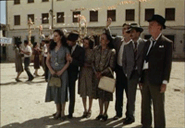“One should remember”, reflects a somber, elderly Carlos Galván (José Sacristán) at the beginning of Voyage to Nowhere as he listens to an old recording by popular folk musicians, the Trío Calaveras. Commenting on the melancholic lyrics of denial and abandonment of a shared history in the aftermath of lost love, Carlos, too, seems to betray traces of his own uncertain memory in his tentative identification of the song’s title. Alternating between past and present, Carlos recounts his former career as a comedian in the family’s road theater variety show in 1950s Spain, a difficult, but beloved vocation that even briefly held the possibility of becoming a family tradition when Carlos’s estranged teenaged son, Carlito (Gabino Diego) unexpectedly arrives to stay with him for an extended visit, much to the consternation of Carlos’s lover and fellow performer, Juanita (Laura del Sol). But Carlito’s introduction into the life of itinerant actors would prove to be far removed from the workings of divine providence. Showing little interest in the flamboyant costumes and spectacle of variety theater (calling their exaggerated performance “ridiculous”) in favor of the austerity of neorealism that infused the New Spanish Cinema of the 1950s, Carlito also proves to be unsuited for a career as a stage actor with his awkward poise, poor memorization skills, and self-consciousness over his Galician accent. Faced with an uncertain future of continued government censorship, non-committal, short-term contracts, and last minute cancelled engagements (including one unwittingly sparked by Carlito’s flirtation with an impresario’s daughter), the troupe’s manager, Maldonado (Juan Diego) convinces the actors to follow the advice of an erstwhile rival turned successful filmmaker Solís (Simón Andreu) and capitalize on a film crew’s forthcoming location shooting in the village to solicit work as extras in order to make ends meet. However, when family patriarch and veteran stage actor, Don Arturo (Fernando Fernán Gómez) is fired from the set after repeatedly delivering his lines with the conscious theatricality and emotive gestures all too familiar in his old-fashioned craft, the troupe is forced to confront its own continued viability in a livelihood that is quickly becoming a cultural relic in the reality of ever-dwindling audiences, separation, and insolvency.
An elegant prelude and illuminating companion piece to Carlos Saura’s ¡Ay Carmela!, Fernando Fernán Gómez’s Voyage to Nowhere chronicles the turning fortunes and endemic poverty that had befallen the itinerant, road theater performers during Franco-era Spain, resulting from both strictly enforced censorship within the regime’s repressive agenda of instilling a selective national culture, and an out of favor, traditional form of entertainment against the popularity of a vital cinema. Weaving truth and fiction, memory and imagination, personal history and anecdotal transposition, Carlos’s rambling memoirs reflect a nation’s sense of disorientation and irreconcilable history under the shadow of the Franco regime as the country emerged from its isolation after years of political turmoil from the Civil War and the Second World War with a revisionist – and institutionally imposed – cultural identity. In a sense, the obsolescence of the road theater in the wake of popular, internationally influenced cinema is not only a supplanting of the artisanal with the technological, but also captures the public’s sentiment of dislocation and penchant for escapism that, in turn, reflects a broader symptom for the country’s social polarization and class stratification engendered by repressive policies of the ruling elite (an inhuman disparity that is also captured in Mario Camus’s The Holy Innocents). It is within this incongruent image between the mundane and the exotic, fame and obscurity, that Carlos’s imagined screen encounter with the iconic Marilyn Monroe becomes, not the fanciful delusion of an aging, forgotten actor, but the liberation of haunted memory in the equilibrium of time.
© Acquarello 2008. All rights reserved.
